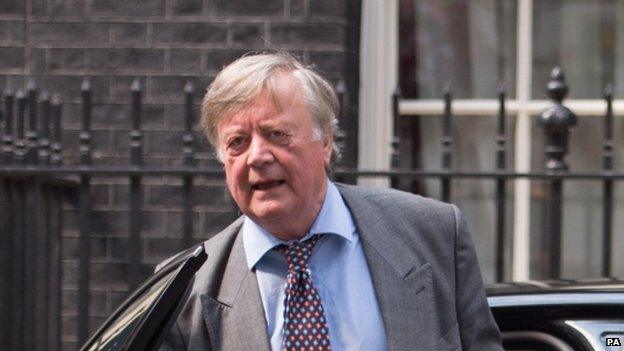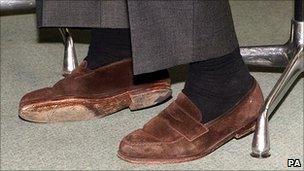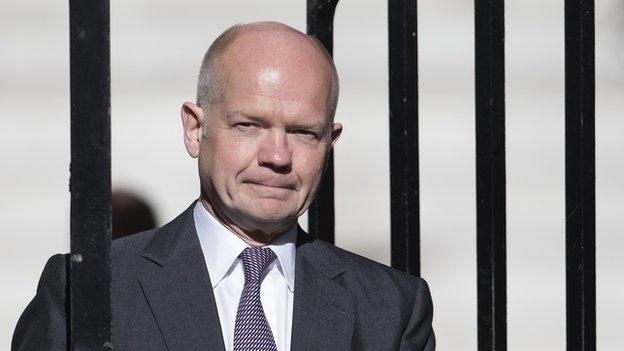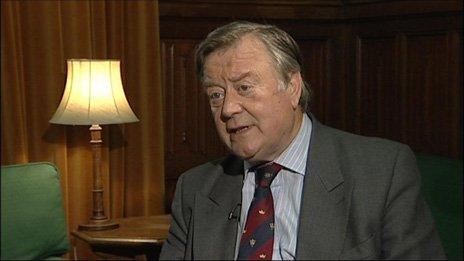Profile: Ken Clarke
- Published

Mr Clarke has been an MP since 1970
Ken Clarke's departure from David Cameron's cabinet has been announced.
The Conservative MP has been a minister without portfolio since September 2012, and before that he was Lord Chancellor and secretary of state for justice from May 2010.
Mr Clarke is reported to have said being part of the coalition government had brought out his "inner liberal" - but his many critics on the Conservative right might argue it was never very well hidden in the first place.
Ardently pro-European in an increasingly Eurosceptic parliamentary party, an opponent of simply "banging up" criminals and an outspoken critic of the Iraq war, he has often seemed a man apart in recent years.
With a blunt-speaking, "blokeish" style, and a penchant for wearing brown suede shoes, he has always enjoyed popularity - and recognition - among the public.
But his troubles with fellow Tories meant Mr Clarke - who has also served as chancellor, home secretary, health secretary and education secretary - never fulfilled his ultimate ambition to be party leader and prime minister.
He ran and failed to become Tory leader three times: in 1997, 2001 and 2005.
'More constructive'
Yet, despite spending 12 years on the back benches during the long period of Tory opposition, and being one of the most rebellious Conservatives in the Commons, he came back.
With power again on the radar, David Cameron appointed Mr Clarke as shadow business secretary in 2009.
And he returned to high office, as justice secretary, as soon as the Tories formed the coalition government with the Lib Dems in 2010.

Ken Clarke's brown suede shoes are a familiar sight
It is in this role that the Cambridge-educated former barrister attracted controversy.
He warned against "banging up more and more people for longer", arguing this merely hardens criminals and advocating a "more constructive" approach, involving greater rehabilitation.
In 2011, he warned MPs not to oppose plans to give some serving prisoners the vote, following a ruling by the European Court of Human Rights - a hugely unpopular development at Westminster.
One high-profile controversy came when Mr Clarke appeared on BBC 5 live to outline the government's policy on rape sentencing.
He appeared to suggest some rapes were more "serious" than others, saying this was reflected in the sentences handed out by judges.
Labour leader Ed Miliband called for his resignation.
Cigars and jazz
But Mr Clarke later sought to clarify his remarks, saying that "all rape is a serious crime" and that he did not think he had suggested otherwise.
If a quieter life was to befall Mr Clarke, even his greatest critics would acknowledge that this would make Westminster a duller place.
Famed for his love of cigars, bird-watching, football, cricket, jazz and classic cars, he is seen as a man with a "hinterland".
Speaking after Mr Clarke's departure from the cabinet was announced, BBC political editor Nick Robinson said the MP had told friends that at the age of 74 he had had enough of red boxes and "enjoyed three days at last week's test match in anticipation of today's announcement".
Mr Clarke, a grammar school boy from Nottinghamshire, had previously been in continuous ministerial office in every Conservative (or Conservative-Lib Dem) government since Margaret Thatcher took power in 1979.
Heath supporter
When he stood for the party leadership in 2001, opinion polls suggested he was most popular Conservative politician with the British people, but still he lost.
After becoming an MP in 1970, Mr Clarke, a keen supporter of the pro-European, "one-nation" Prime Minister Edward Heath, rose gradually.
Within two years of his election he was an assistant whip, rising to whip and then becoming a junior spokesman on the opposition benches.
When Mrs Thatcher entered Downing Street she appointed Mr Clarke as a junior transport minister.
Over the next nine years, he served as a minister in the departments of health, employment and trade and industry.
In 1988 he entered the cabinet as health secretary, with the job of driving through controversial and far-reaching reforms of the NHS, including the internal market.
'Golden legacy'
When John Major became leader in 1990 he moved Mr Clarke to education and later the Home Office.
After the disastrous events of Black Wednesday, the resignation of Norman Lamont and the decision to leave the European exchange rate mechanism, Mr Clarke was made chancellor.
His period in charge of the Treasury saw interest rates, inflation and unemployment all falling, described by many Conservatives as the Major government's "golden legacy" to Tony Blair's Labour.
However, Mr Clarke was always a supporter of closer European integration, which became more of an issue when the Conservatives became deeply divided over the issue in the mid-1990s.
The "Maastricht rebels" - the MPs who lost the Tory whip over their objection to the government signing up to the Maastricht Treaty, aimed at greater European union - came to regard Mr Clarke as a key enemy.
This feeling has never gone away.
Having lost the Tory 1997 leadership election, Mr Clarke headed to the back benches, taking on some company directorships and the deputy chairmanship of British American Tobacco.
He continued to antagonise many anti-European Tories with his enthusiasm for the UK to join the single currency.
In a scene regarded as a betrayal, he shared a platform with Tony Blair to proclaim the merits of the euro.
Mr Clarke was also one of the strongest advocates of not invading Iraq, in direct contravention of the Tory leadership.
He has always been his own man and has, arguably, stayed the same in his views while those of most in his party have changed.
- Published15 July 2014

- Published18 May 2011
